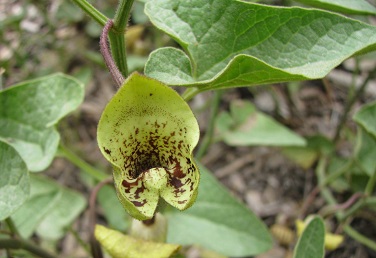Herbs And Phytochemicals: Italian Study Shows That Phytochemicals From Aristolochia Olivieri Can Prevent And Help With Gastric Cancer!
Nikhil Prasad Fact checked by:Thailand Medical News Team Nov 11, 2023 1 year, 5 months, 1 week, 2 days, 17 hours, 10 minutes ago
Herbs And Phytochemicals: Gastric cancer, a formidable global health challenge, demands innovative approaches for prevention and management. Adenocarcinoma, the predominant subtype, is influenced by various environmental factors, including Helicobacter pylori infection and diet. This
Herbs And Phytochemicals News report explores a groundbreaking Italian study conducted by the University of Urbino “Carlo Bo,” University of Bologna, Salahaddin University, Tishk International University, IRCCS Istituto Romagnolo per lo Studio dei Tumori (IRST), and University of Camerino. The study investigates the potential of phytochemicals from Aristolochia olivieri Colleg. ex Boiss. leaves in preventing and treating gastric cancer.
 Gastric Cancer: A Global Health Concern
Gastric Cancer: A Global Health Concern
Gastric cancer, encompassing adenocarcinoma, ring cell carcinoma, and undifferentiated carcinoma, stands as a leading cause of global mortality. While its incidence is high in East Asia, Eastern Europe, Central and South America, Italy reports a comparatively lower occurrence. Typically developing in individuals aged 45 and above, gastric cancer is primarily sporadic, with environmental factors such as H. pylori infection, diet, tobacco smoking, and inflammation contributing to its risk. Current treatments involve chemotherapy and surgery, emphasizing the need for preventive measures, including exploration into the potential of natural substances.
Phytochemicals and Anticancer Properties
Preclinical studies have revealed the anticancer potential of various food substances. Extracts from hibiscus, for instance, displayed cytotoxic effects on gastric adenocarcinoma cells without adverse effects on cardiovascular and central nervous systems. Phytocomplexes and isolated compounds, such as those from Patrinia heterophylla Bunge roots, have shown significant anticancer activities. Polyphenols, including flavonoids and phenolic acids, have demonstrated inhibitory effects on gastric cancer cells, aligning with epidemiological studies suggesting a polyphenol-rich diet may reduce gastric cancer risk.
The Choice of Aristolochia olivieri
In this study, Aristolochia olivieri Colleg. ex Boiss. was selected due to its historical use in Kurdish folk medicine for gastrointestinal ailments. A methanolic extract was chosen for its effectiveness in extracting phenolic acids and flavonoids, known for their potential against gastric cancer. The study conducted a comprehensive evaluation of the extract's chemical composition, in vitro antibacterial activity against H. pylori, and its antineoplastic effects on gastric cancer cell lines. For references, Aristolochia olivieri Colleg. ex Boiss. Leaves’ methanolic extract in this study is referred to as AOME.
Chemical Composition of AOME
The methanolic extract from Aristolochia olivieri revealed a rich chemical composition, featuring flavonoids and phenolic acids. Delphinidin-3-galactoside, rutin, and hyperoside were prominent among the flavonoids, while caffeic acid dominated the phenolic acids. The total content of identified polyphenols in AOME was 30956.87 mg kg−1, showcasing its potential t
herapeutic richness.
Antimicrobial Activity Against H. pylori
AOME exhibited significant antimicrobial effects against H. pylori, with MIC and MBC values of 3.70 ± 0.09 mg/mL. These findings suggest AOME's potential as an effective natural agent against H. pylori, a major risk factor for gastric cancer.
Antineoplastic Properties: In Vitro Experiments
The impact of AOME on gastric cancer cell lines (AGS, KATO-III, and SNU-1) was assessed through in vitro experiments. AOME demonstrated a dose- and time-dependent reduction in cell viability for all cell lines. Morphological analyses revealed ultrastructural changes, indicating the occurrence of cellular apoptosis. The study suggested that AOME possesses potent antineoplastic properties, making it a promising resource for innovative nutraceutical approaches in gastric cancer management.
Molecular Insights into AOME's Effects
The study provided a detailed insight into the chemical composition and biological effects of AOME. The apoptotic effects observed in the gastric cancer cell lines were characterized by significant alterations in cellular morphology, including vacuolization, changes in mitochondrial structure, and signs of autophagy and mitophagy. While the specific molecular mechanisms underlying these effects were not extensively investigated, the observed alterations provide valuable preliminary insights into AOME's potential role in inducing apoptosis in gastric cancer cells.
Synergistic Interactions among Phytochemicals
The study highlighted the complex interplay and potential synergistic effects among the diverse bioactive compounds present in AOME. Despite some compounds being present at subactive concentrations, the overall apoptotic activity observed suggests a synergistic network, where interactions between different compounds amplify their cytotoxic and apoptotic effects.
Future Directions and Conclusions
This Italian study signifies a crucial step towards understanding the therapeutic potential of Aristolochia olivieri in the context of gastric cancer prevention and management. The antimicrobial activity against H. pylori and the potent antineoplastic properties demonstrated in vitro suggest that AOME could be a valuable natural resource for developing innovative nutraceutical strategies. However, further research, including in vivo studies and an exploration of the precise molecular mechanisms, is essential to validate and fully comprehend AOME's potential clinical applications. This study opens new avenues for the development of novel nutraceuticals contributing to the prevention of gastric cancer, emphasizing the significance of natural compounds in innovative cancer management approaches.
The study findings were published in the peer reviewed International Journal of Molecular Sciences.
https://www.mdpi.com/1422-0067/24/21/16003
For the latest on
Herbs And Phytochemicals, keep on logging to Thailand Medical News.
